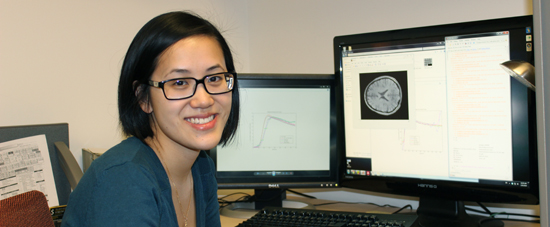Student Spotlight: Mai Le – Finding a better way to diagnose breast cancer with MRI
The research group is using statistical signal processing to create crisper images with only 20% of the data required by a traditional MRI scan.

 Enlarge
Enlarge
Mai Le
3rd year PhD student
Specialty: Magnetic Resonance Image (MRI) Reconstruction
Advisor: Prof. Jeffrey Fessler
Recent Honor: CoE Distinguished Leadership Award
Magnetic resonance imaging (MRI) technology is not fast, and it’s not cheap. Mai Le, PhD candidate in Electrical Engineering:Systems, is conducting research as part of Prof. Jeff Fessler’s group that could very well change this situation. She is also working on new techniques to determine the character of a tumor in breast tissue.
The research group is using statistical signal processing techniques to create crisper images with only 20% of the amount of data required by a traditional MRI scan. The result is less patient time in the scanner and images generated much faster, making MRIs a more cost-effective option for patients and doctors alike.
Mai is embarking on new research to improve breast dynamic contrast enhanced (DCE) MRI. She explained, “Tumors absorb blood and contrast agents at a higher rate than surrounding tissues. We can look at the way these contrast agents are absorbed over time into the bloodstream and regions of the breast that are questionable, and based on this information, statistically determine whether a tumor is malignant or benign.”
Eventually, said Mai, the dream is to have these methods readily available in hospitals. With this information in hand, doctors can better determine whether a patient should undergo a surgical biopsy.
Mai grew up in Texas, and was involved in her high school’s visual arts community. She said she finds her current work to be “a really cool way to combine my interests in biological sciences and medicine with image processing, and it also ties in my enjoyment of math and electrical engineering.”
As she was about to complete her undergraduate degree at Stanford, Mai asked one of her professors for advice on graduate school. The professor happened to be a former lab mate of Prof. Fessler, and suggested she include Michigan in her search. Mai had a pretty good idea of the type of advisor she wanted to work with, and Prof. Fessler immediately fit the bill.
“I felt we had similar goals,” said Mai. “I wanted to be able to get some teaching experience and give back to the community in terms of educational outreach, and we clicked on those accounts. His encouragement has helped me work through a lot of obstacles, and that was something I felt I needed in an advisor. He also has a knack for listening through to the core to what a student doesn’t understand. He’s a great teacher.”
Mai does a lot of outreach as the Community Service Co-Chair of the Graduate Society of Women Engineers. One of her favorite outreach activities is her collaboration with 826michigan, a nationwide nonprofit writing and tutoring organization.
When asked about her favorite thing about Michigan, Mai said she appreciates the huge number of student organizations here, as well as what they accomplish. “I see a lot of passion among students about their research, about revitalizing Detroit, and about outreach in the community. I think that’s very cool. The vast amount of resources at Michigan is really great.”
 MENU
MENU 
